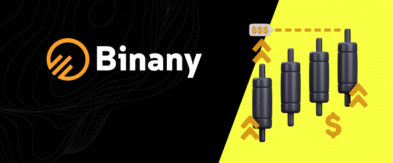Mutual Funds for Beginners: Complete Starter Guide (2025) India
Mutual funds for beginners are the perfect collective venture solution where you can start investing even without in-depth market knowledge. On platforms like Binany, you can easily choose to explore the features of a collective fund, compare their characteristics, and start investing even with a small amount. Keep reading this article to learn more about how it works, their benefits for investors, fund manager, index fund, the role of regulator SEBI in protecting your capital allocations, and the practicalities of investing - from KYC clearance to choosing between regular (SIP) and lump sum investments. More about how to make investment decisions.

Definition of Mutual Funds and Their Importance in India
A mutual fund for beginners is a modern financial tool that can be used to accumulate portfolios from different investors to invest in different assets. Collective fund investment for beginners can include shares, bonds, and semiconductor stocks. Professional asset managers are then engaged in purchasing and selling assets on your behalf. Newcomers can enjoy many benefits, namely:
- Affordability. You can start even with a small amount.
- Professional management. The whole process is managed by a professional so you don’t need any special knowledge of finance.
- Diversification. Investors’ money is distributed among different businesses, which lowers the possibility of losses.
- Liquidity. In most cases, you can receive your money back if it is necessary.
Investing in mutual funds for beginners is a safe exercise as everything is managed by SEBI. It is a regulator that makes sure that your portfolio is protected. It sets the rules for managed portfolios, which ensures protection against fraud, controls fund expenses, and protects small investors.
Before investing, check out Binany’s beginner-friendly mutual funds guide, with a handy comparison tool to help you find a fund that fits your needs.
Understanding Different Mutual Funds Types for Beginners in India
How to start investing in mutual funds? Numerous newcomers to the area ask this question. Firstly, you need to understand the main types:
- Equity Collective Assets. It invests the majority of its money in company stocks. They have a high return potential but also elevated risk as a consequence of market volatility. This type is suitable for long-term goals when you have time to weather market downturns.
- Debt Mutual Instruments. This is when the government borrows money from you at interest. This earns a steady but usually low income, because it is a more predictable and safer method. It is ideal for conservative investors.
- Balanced Funds. These combine stocks and bonds income portfolios and provide a balance between reward and risk. It is a type suitable for investors with a medium risk profile.
- Tax-saving mutual ELSS Funds. These portfolios may invest predominantly in equities but offer tax benefits. They require a mandatory lock-in period (usually 3 years). Investors get the opportunity to save on taxes with good capital growth potential.
- Semiconductor mutual funds India. These are those that focus on specific sectors or investment themes. They exhibit higher volatility but can deliver significant returns if the sector is well chosen. Experienced investors use them for additional mutual fund portfolio diversification.
Once you understand these types, the following action is to make your selection. Before making your investment decision, study the fund’s performance history over the past 3-5 years to understand its stability. Don’t chase after investment option that have shown exceptional returns only in the most recent year, because this could be a temporary phenomenon. Consider a systematic investment plan if you’re looking to invest in mutual fund products gradually over time and build a mutual fund portfolio aligned with your financial goals.
On the Binany platform you can filter mutual funds investments plans for beginners by risk level and past performance, which will help you find the portfolios that match your investment objectives.
Invest in Mutual Funds: How to Start
How to invest in mutual funds online in India for beginners? This is one of the most common inquiries. For that, follow this simple guide to mutual funds in India:
- Choose the platform. Decide where you want to begin investing.
- Go through KYC. Go through identity verification to legally start investing.
- Decide the type of investment. Decide which way of investing suits you – SIP or one-time investment.
- Check the checklist and invest. Before making a final decision, check the chosen fund against the key parameters and make an investment.
Among the crucial elements is the selection of platforms. Your comfort and efficiency of investing depends on it. The best option is Binany, which not only provides an intuitive interface and quality support services, but also a bonus on the first deposit.

Also, pay attention to the choice of the type of investment, as it significantly affects future income. The lump sum is appropriate for those who have a large amount and an understanding of the market. Regular investments (SIP) are ideal for novices with a regular income because it reduces risks by averaging the cost of buying assets in different market periods.
Checklist Before Buying for Investor
Smart investing requires careful consideration of your options before committing your money. Be ready that every new occupation will be accompanied by mistakes. Read our checklist to avoid most of them. Before you click the “Invest” button, make sure you check:
- The fund’s objectives and do they align with your investment objectives?
- Historical returns — How has the fund carried out under various market circumstances?
- Fees and charges — What fees does the fund charge (entry, management, exit)?
- Management company — How reliable and experienced is it?
- Size of the portfolio — Asset collections that are too small or too large can have their problems.
- Holding period — Is there a lock-in period or penalties for early exit?
- Tax implications — What taxes will you have to pay?
Before finalizing your financial decision, consider how funds based on collective management can offer valuable advantages. These wealth vehicles handle the complexities while you focus on results. The association of mutual funds established strict standards protecting your interests as a participant. Many mutual funds available today suit different risk appetites and goals. HDFC mutual fund and ICICI stand among trusted providers with established track records. Their expert teams carefully analyze market conditions daily.
Mutual funds that invest across diverse sectors provide natural protection against market volatility. Funds are a type of long-term growth solution for cautious savers. Regular performance reports keep you informed about your holdings.
The mutual fund investment guide provided by Platform Binany helps newcomers understand key concepts. Even beginners find these financial options accessible and easy to understand. Platform Binany streamlines this process further by consolidating all your financial activities in one convenient location.
Platform Binany brings together all stages of investing in one place — from tracking fund performance to managing SIP payments, making the whole process simple and accessible for investors.
Consider Before Investing in Mutual First-Time
Before you start investing, you need to be clear about why you are doing it. It may be a desire to provide your children with a good education, to retire early, or to save for a house faster. Also decide how much of a risk taker you are. Take some time for honest self-reflection about your financial goals and timeline. Remember that investing is personal – what works for others might not work best for you. Depending on this, you can choose more conservative instruments or semiconductor penny stocks India. Write down your financial dreams with specific dates to make them feel more real and achievable. People who put their money goals on paper tend to stick with their plans even when markets get scary.
Fundamentals of Understanding Mutual Funds
It is important for investors to understand that NAV is the price per share of the fund at which buy and sell transactions take place. Think of NAV like a price tag that changes daily based on how the fund is performing. Don’t get caught up chasing portfolios with the lowest NAV – it’s the growth potential that really matters. When selecting a fund, pay attention to entry fees, exit fees, and annual management fees, which directly affect the final return on your portfolio. Look at how a portfolio performed during both good and bad times, not just during recent market rallies. Those small percentage fees that seem insignificant today can significantly reduce your total returns over the long term.
Balancing Your Type of Mutual Fund Scheme Selections
Spread your investments across different fund types, sectors, and asset classes. Start small with a few core portfolios and progressively grow your portfolio as you learn more. The goal isn’t having dozens of different types of mutual funds, but rather meaningful diversity that matches your goals. Diversification lowers the portfolio’s total risk of your portfolio, protecting you from severe losses when individual sectors are in trouble. Consider adding some precious metals or real estate options that often move differently than the stock market. Your careful planning pays off most when markets get rocky and emotions run high.
Essential Tips for Understanding
Also, don’t forget about taxes. As an investor, you need to know the tax breaks for long-term investments and the lock-in periods for investments. Consider talking with a trusted friend who has investing experience – they can share practical advice you won’t find in brochures. Developing good habits like regular review of your portfolios can make a huge difference over time. Some asset collections have restrictions on early withdrawals or charge additional fees. Set up automatic monthly contributions so saving becomes a habit rather than a choice. A simple tracking app can help you see when your portfolio needs rebalancing to stay on target.
Smart Fund Selection for Beginners
Mutual funds are among the greatest places to start for new investors. Understanding the types of mutual funds helps you make better choices. Debt funds and income funds offer stability, while equity mutual funds invest in stocks for growth. Small-cap funds target emerging companies, and sectoral funds focus on specific industries. Funds for beginners in India include balanced options with mixed portfolios. Some ELSS funds have a lock-in period, especially tax-saving varieties. Mutual funds allow diversified investment in securities with a single purchase. When you invest in a mutual fund, you buy fund units representing your ownership share.
With the Binany Learn education platform, you get simple and clear explanations of terms and avoid common beginner mistakes. Their materials help you understand complex financial concepts without specialised education.

Best Mutual Funds for Beginners: 2025 Investment Goal
Starting with trusted options is the wisest choice when you’re new to the investing world. If you are a novice investor and are just looking for collective funds for beginners India, then consider these most popular options:
- Tata Semiconductor Mutual Fund. This is a technology-oriented portfolio, which is among the list of popular portfolios on investment platforms. The fund aims for long-term capital growth by investing at least 80% of its assets in equities of companies in the digital sector.
- HDFC Equity Fund. One of the well-known portfolios, which has an experienced management team with years of experience in the equity market. It makes a diversified portfolio of equities of companies of different capitalization.
- ICICI Prudential Technology Fund. A specialised portfolio focused on the technology sector. It is managed by ICICI Prudential Asset Management Company Ltd, which is a joint venture between ICICI Bank in India and Prudential Plc in the UK.
You can consider these options in the initial stages of investing to reduce the time of searching for suitable options. Start simple with trusted companies rather than chasing hot trends. Small monthly deposits work better than waiting to save big amounts. The longer you stay invested, the better your chances of success. Your first choices don’t need to be perfect – you can always adjust as you learn more.
Use Binany to compare the latest performance of asset collections in different sectors like semiconductors, technology, and energy. Their tools help you select the right portfolios based on their current performance and growth potential.
Summary
Investment portfolios are an accessible and effective way to invest, especially for novices. They pool the money of many investors, and provide professional asset management and risk diversification. How to invest in mutual funds for first-time? To do this, you need to pass KYC, choose a suitable platform, and decide on the method (SIP or lump sum). Before buying, it is important to evaluate the fund’s objectives, historical performance, fees, and tax implications. The Binany platform helps simplify the entire process – from choosing a fund to tracking results. Even small regular deposits can grow significantly over time through the power of compounding. Starting early gives your money more time to work for you, even if you begin with modest amounts.
FAQ
What Is NAV Abbreviation?
It stands for Net Asset Value. It indicates the value per share of a managed portfolio and is updated daily. NAV helps investors track performance trends.
How Much Should I Invest Initially?
You choose the amount based on your goals. Starting with smaller sums helps reduce risk. Platforms like LinkPay support minimal deposits for beginners.
Can I Withdraw Anytime?
Yes, most portfolios allow withdrawals anytime. Some, like ELSS, have lock-in periods. Redemption usually takes a few business days.
Are Collective Investment Schemes Safer Than Stocks?
Yes, they offer professional management and diversification, lowering risk compared to owning individual stocks.
Do I Need to Pay Taxes?
Yes. Tax rates vary by fund type and holding period. Consult a tax advisor to optimize your strategy.
How Do I Track Fund Returns?
Use your platform’s app or site for return reports, graphs, and comparisons with benchmark indices. Monitoring helps guide decisions.
Which Type of Collective Funds in India Is Best for Novices?
Index and balanced hybrid funds are ideal for beginners due to moderate risk, diversification, and low expenses.
Can I Invest 1000 RS per Month in Collective Funds?
Yes, many investors start with SIPs. Monthly investing builds discipline and benefits from cost averaging over time.
What Is the 7-5-3-1 Rule in SIP?
It reflects expected returns: 7% (15+ years), 5% (10 years), 3% (5 years), 1% (1 year). Helps set realistic investment goals.
Can I Invest 100 RS Daily in Collective Funds?
Yes, if supported by your platform. Micro-SIPs aid in compounding wealth. Some apps cater to small daily contributions.

Financial writer and market analyst with a passion for simplifying complex trading concepts. He specializes in creating educational content that empowers readers to make informed investment decisions.


